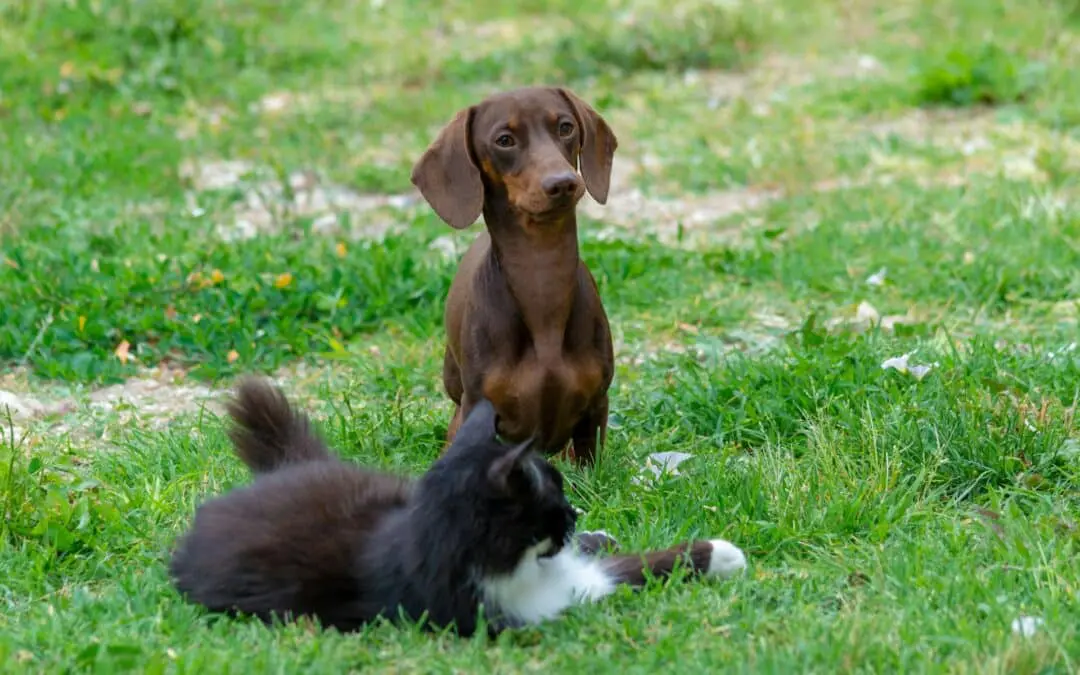Is Arizona dangerous to pets? It can be. The main risks involve the climate and encounters with wildlife. Keeping your pet safe in the summer means knowing how to recognize the signs of dehydration and heatstroke. You also need to know how to keep your pet safe from poisonous reptiles and insects, as well as predators. And if there’s ever an emergency, knowing who to call could save your pet’s life.
How the Climate in Arizona Affects Pets
Heatstroke
Arizona can reach some high outdoor temperatures in the summer, so understanding the signs of heatstroke can save your pet’s life. Last summer some of our highs were over 111ºF. Unlike humans, our pets live in a fur coat. This traps heat which can result in struggles with breathing, organ failure, and even death. This is why it is important to take preventative measures to reduce their risk of heatstroke.
If you notice intense panting, vomiting, diarrhea, or incoordination, take action right away. Place wet towels over your pet’s body, move them into the shade, and then call your veterinarian.
Dehydration
Due to our high temperatures and lack of humidity, dehydration is another big concern for our Arizona pets. Dehydration can lead to kidney failure, seizures, and, if left untreated, death. If your pet has dry gums, a reduction in urination, and excessive panting, they may be dehydrated.
If your pet is in the early stages of dehydration, which looks like light panting or reluctance to continue an activity, encourage them to drink water and try to get them to rest.
If your pet is severely dehydrated, bring them to a veterinarian right away. Severe dehydration typically looks like extreme lethargy, vomiting, or even seizures.
Dust Storms
Arizona’s dust storms can also pose a danger for pets. The dust can irritate their respiratory systems or cause particles to get stuck in their eyes or in minor wounds. During these storms, it is important to keep your pet inside. If they need to go out, cover their nose and eyes as best as you can. Once back inside, make sure to clean them thoroughly, so no dust can build up on their coats and paws or in their eyes, ears, or nose. We recommend a full bath, but wet washcloths can do the trick in a pinch.
Encounters with Wildlife
Venomous Reptiles and Insects
Here in Arizona, we have quite a few poisonous and venomous reptiles and insects. They can be dangerous to curious pets who try to catch them or play with them. Eating a poisonous insect or getting stung by a scorpion could turn into a pet emergency.
To avoid encounters with snakes, keep pets on a leash during walks and stick to the trail when hiking. To keep spiders and scorpions out of your home, clean and dust in the corners and under furniture, place traps, and if it looks like your pet might be playing with a bug, be ready to intervene.
Predators
Pets are also at risk of becoming prey for many wild animals in Arizona. Mountain lions, black bears, javelins, and coyotes are all predators that can harm your pets. Cats and small dogs are especially vulnerable to attacks. Make sure you keep your pets on a leash during hikes, and don’t let them roam. Keeping cats indoors and dogs in a fenced yard will keep them safe.
Cacti
The needles on cacti can be dangerous for pets. Their sharp needles can cause puncture wounds, and if any spines get stuck, they are painful to remove. Small wounds can be treated at home. However, if the needles are close to the eyes, cover a significant amount of your pet’s body, or you are having trouble removing them, contact your veterinarian for help.
Emergency Veterinary Care in Gilbert, Arizona
Here at East Valley Animal Hospital, we are dedicated to providing the highest level of care, whether it’s an urgent visit or a preventive care appointment. Our team of highly trained veterinarians and support staff are ready to handle any pet emergency. We also have state-of-the-art technology that helps us make a quicker diagnosis so we can provide the right treatment.
If your pet has an emergency, call us right away. We’ll let you know if there is anything you need to do before you bring your pet to see us.
Images used under creative commons license – commercial use (5/12/25). Photo by Christian Cacciamani on Unsplash.

